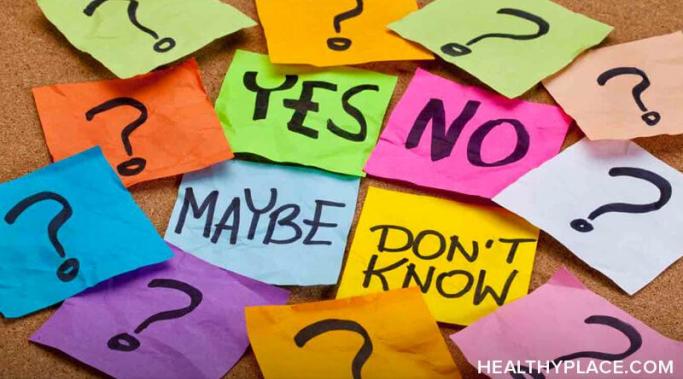Blogs
People who have strange dreams can worry that strange dreams and mental health are related, when in fact they may not be. Strange dreams happen for neurotypical people as well as those with mental illness, and these dreams often mean nothing at all.
This week, I was thinking about how you need a plan for anxiety. Anxiety can pop up without rhyme or reason, stay for an indeterminable amount of time, and sometimes can vanish so quickly that we don't realize the change right away. When anxiety arises quickly, it can be difficult to maintain the awareness that we are not anxiety, and this can make it more difficult to cope. Part of this difficulty occurs because anxiety affects more than our emotional state -- it affects our cognitive state. But a plan for anxiety can help with all this.
This week I have been physically unwell while living with borderline personality disorder (BPD). I have a virus and it has really affected me emotionally. I have been low in energy and so have been unable to do my usual coping strategies. I have found that when I am physically ill, I feel really guilty for taking time off work and resting even though it is perfectly justified to do so.
There's a new Weight Watchers weight loss application (app) for kids called Kurbo. When I first heard about Kurbo I felt a little nauseous. It’s precisely the sort of thing that a young, adolescent me – embroiled in an eating disorder – would have latched onto as a source of “inspiration” to fuel my illness. I was curious as to how Weight Watchers, recently rebranded as WW, would market and defend their new product – and why they thought the app was even remotely a good idea.
Remembering my medication at this point in my life and mental health recovery is very important. I accept that I need psychiatric medication to function. That can be a hard thing to admit sometimes. I'm at a place where I have a lot going on in my life and I feel it would fall apart if I didn't take my medication. Long story short -- my medication is extremely important.
As a recovering addict, I have been fortunate enough to encounter many methods of recovery, including but not limited to the 12-step group for sex addiction. I first found my way to the most common group options like Alcoholics Anonymous (AA) and Narcotics Anonymous (NA), and eventually, I discovered the variety of sex addiction-related 12-step groups available. After spending plenty of time in the 12-step group world, I can honestly say that I'm abundantly grateful for the recovery work they do within the community. However, I cannot give 12-step groups all the credit in regards to my recovery experience and maintaining sobriety.
It can be hard to find someone to talk to about your depression yet it is one of the first pieces of advice people give. Others tell you to find someone to talk to. That someone could be a friend, a family member, or a professional therapist. Whoever it is, the important thing is that you have someone to talk to about your depression. But sometimes, for whatever reason, we have no one.
Grey area verbal abuse makes it hard for you to tell who is an abuser and who is simply human, especially after coming from a place of prolonged abuse. How do you tell an abuser from someone unintentionally hurtful? This was a question I hadn't considered after I broke free from my narcissist.
We all have habits that cause anxiety or worsen existing anxiety. This does not mean that we're intentionally causing our own anxiety, not at all. No one is to blame for their anxiety. Habits are merely things we do (or don't do) because we're so used to doing them, we don't even think about them. Occasionally operating on autopilot and inadvertently doing things that worsen or cause anxiety is actually pretty empowering. When you learn about habits that worsen your anxiety, you can actively stop those actions and replace them with more mentally healthy ones.
Borderline personality disorder (BPD) is one of the most stigmatized mental health conditions, along with conditions such as schizophrenia, dissociative identity disorder and other personality disorders. I have been discriminated against by healthcare professionals, struggled for years to talk openly due to stereotyping and see few compassionate representations of the condition in the media. There are three main myths about BPD and I will outline them here.









